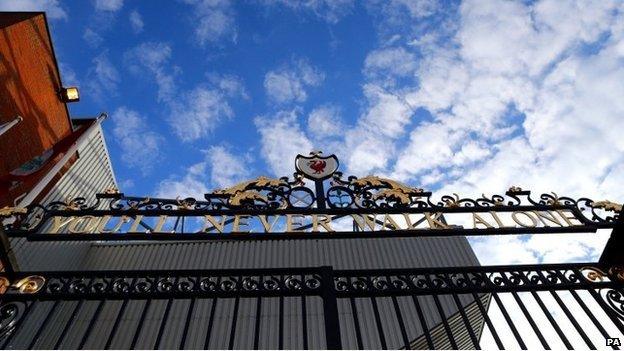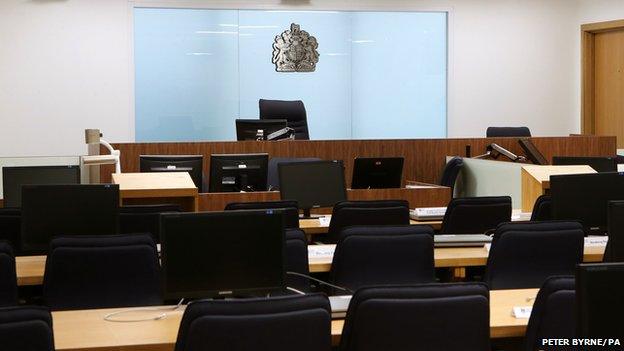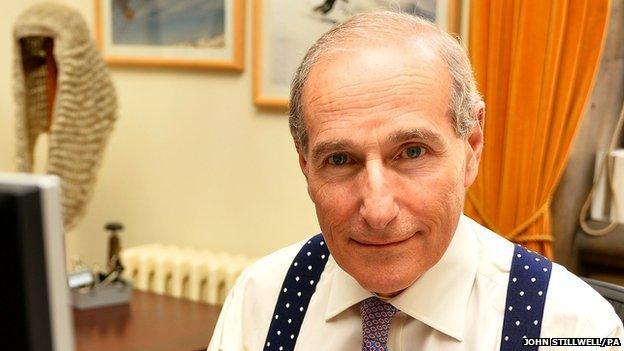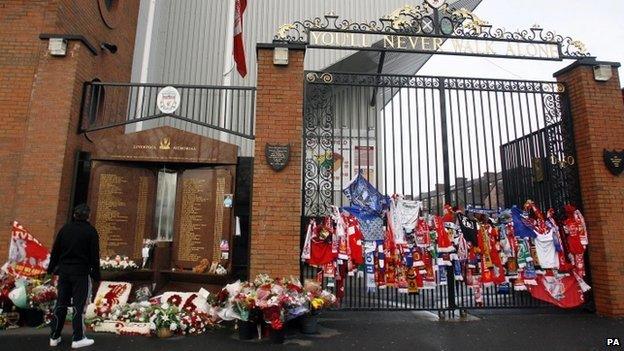Hillsborough inquests: Looking at how 96 Liverpool fans died
- Published

Families of the 96 people who died are hoping the new inquests will shed new light on the tragedy
New inquests are being held to investigate how 96 football fans died as a result of the Hillsborough stadium disaster on 15 April 1989. The victims were all Liverpool supporters watching their team play Nottingham Forest in an FA Cup semi-final at Sheffield Wednesday's ground.
The BBC's Hillsborough reporter Ben Schofield explains the process.
What is happening?
The inquests are taking place in front of Lord Justice Goldring, a Court of Appeal judge who is acting as coroner for the hearings. The Ministry of Justice has built the biggest courtroom in England and Wales, in an office building near Warrington, to host them.
Lord Justice Goldring ordered the hearings had to be held in the north west of England because most of the victims' families live in the region.
Unusually for inquests, a jury will hear the evidence and will be asked to decide on the verdict.

The inquests will be held in a purpose-built courtroom in an office building in Birchwood Park, in Warrington
What will the inquests cover?
Strictly speaking, inquests are held to record the identity of the deceased, as well as when, where and how they died. To do this, the Hillsborough inquests are expected to hear evidence on several themes:
stadium safety, which may include the design of the ground
South Yorkshire Police's preparations for the match
crowd management on the day
how the emergency services responded to the disaster
the individual experiences of the 96, including medical evidence about how exactly they died
Why are they being held?
These are not the first Hillsborough inquests. A series of 'mini-inquests' and a larger generic hearing took place between April 1990 and March 1991.
The accidental death verdicts on all 96 men, women and children who died stood for more than 20 years until they were quashed by the High Court in December 2012.
The court then ordered new inquests to be held.

Lord Justice John Goldring has been appointed as the coroner for the new Hillsborough inquests
How did we get here almost 25 years on?
The High Court was asked by the Attorney General, Dominic Grieve QC, to quash the original verdicts. He did so shortly after the release of the Hillsborough Independent Panel report, in September 2012.
The panel consisted of nine independent people, each experts in different fields, and was chaired by the then Bishop of Liverpool, the Right Reverend James Jones.
They scrutinised about 450,000 pieces of evidence including new evidence about the disaster and how the 96 died.
What else is going on?
There are two other investigations going on into Hillsborough: a police investigation called Operation Resolve and an Independent Police Complaints Commission (IPCC) inquiry. Both will continue while the inquests are going on.
Operation Resolve, which is being led by Assistant Commissioner Jon Stoddart, who is Durham's former chief constable, is looking at events leading up to the disaster, as well as the disaster itself.

Accidental death verdicts on the 96 men, women and children who died were quashed in December 2012
That includes all the decisions about managing the crowds on the day, responding to the events as they unfolded, as well as the stadium design and safety checks. The Operation Resolve team is feeding material into the inquests as they find it.
The IPCC is looking at police activity after the disaster and whether any serving or former officer is guilty of misconduct, including any allegations of a cover-up.
How long will it all take?
The inquests are currently due to last until the end of the year, but some of the legal teams say they could run into 2015.
Operation Resolve and the IPCC investigations do not have a fixed time frame, but are unlikely to conclude before the inquests are over.